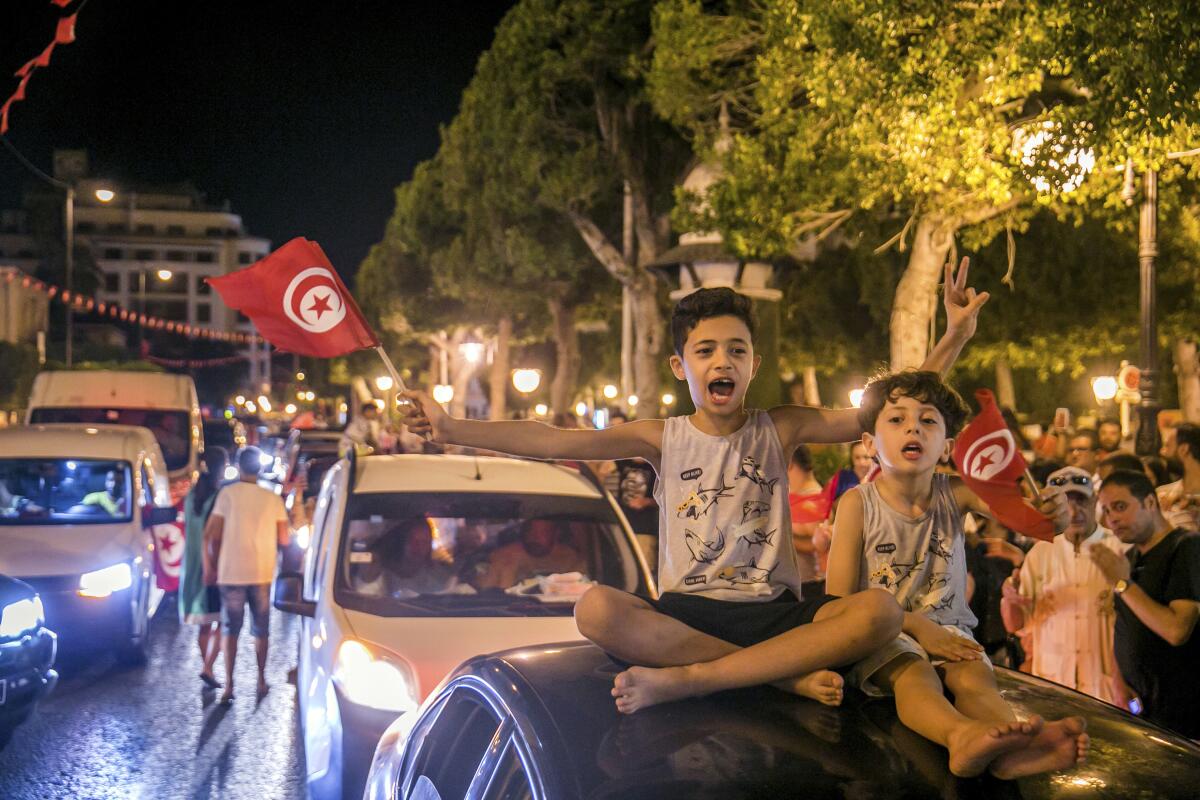Op-Ed: Is Tunisia rolling back the revolution? It’s not that simple

- Share via
TUNIS — One year after Tunisian President Kais Saied dissolved parliament, sacked the prime minister and monopolized all three branches of government, Tunisians headed to the polls last week and voted on a new constitution that critics feared — and supporters acknowledged — would further enshrine a one-man rule.
Our North African nation of 12 million people sparked the series of revolutions across the Middle East and North Africa in 2011. Now opposition forces and foreign observers consider the July 25 referendum vote, which ratified the new constitution, as the end of Tunisia’s nascent democratic experience. This view is understandable given Saied’s controversial drafting of the new constitution to replace the 2014 constitution that was developed through a political consensus, given the relatively low referendum turnout and given the overall unilateral approach Saied has adopted since last year.
Tunisia analysts are writing the eulogy for the country’s democracy. Yet they’re missing out on another story that we have found in our work, researching and reporting across the country: Young Tunisians — who participated in the 2011 uprising that ousted dictator Zine el Abidine ben Ali after 23 years of rule, and have consistently taken part in protests in the decade that followed — feel otherwise. Tunisia’s youth are preparing for the battles to come. They’re focused on a renewed sense of resistance against all political elites.
The outcome of the referendum provides clues about the Tunisian public opinion. Tunisia’s elections authority, known by its French acronym ISIE, announced initial results July 26, showing 94.6% approved the proposed constitution. Turnout was 30.5% of Tunisian voters.
There are doubts over how reliable those numbers are, and 30% turnout does not constitute sufficient buy-in for a constitutional referendum. But both the “yes” results and the abstention rate send political messages. First, more than 2.6 million Tunisians voted “yes,” and there were scenes of popular jubilance following the announcement of exit polls. Such favorable displays, however, do not reflect unconditional support for Saied himself. Rather, they show a desire to punish the post-2011 ruling elite, with which the bulk of “yes” voters have grown disenchanted.
Second, the 70% of voters who didn’t show up for the referendum do not all constitute active boycotters. Many citizens were either too skeptical or apathetic to vote, which fits the decreasing trend in participation rates from one election to another since 2011.
Tunisia’s failing economy also continues to drive discontent. “Democracy is pointless when people’s purchasing power is on a downward spiral,” 30-year-old Omar, an engineer living in the capital, Tunis, told one of us in an interview. An overwhelming number of Tunisians adhere to this sentiment, as we’ve learned in our work, because the failure to address the deteriorating economy since the 2011 revolution created doubts over democracy.
Many feel that successive governments since the revolution marginalized citizens’ grievances and priorities, which can still be summarized by the 2011 slogan: “Bread, Freedom and National Dignity.” The thousands of protests across the country calling for equity and social justice never ceased over the past decade. This will not change under Saied, even though mobilization and dissent are bound to become more difficult.
In his anti-elite project and rhetoric, Saied initially gained widespread support as an outsider when he was elected president in 2019. He claimed to have a political vision for the country and repeatedly highlighted the gap between citizens and decision-makers, especially political parties that have been long-entrenched since the 1980s.
Saied also joined in mass criticism within Tunisia over one of the country’s most internationally celebrated events: the National Dialogue Quartet of 2013, for which civil society groups won the Nobel Peace Prize. Many Tunisians have contested the dialogue, saying it is symptomatic of elites’ self-centered politics. While it was necessary to produce a consensus culture post-revolution, the wider perception is that this dialogue was exclusively elite-oriented and did not involve any vision and concrete policy in service of the people. In a sense, the ruling parties were in dialogue among themselves, but not with the people. This undermined citizens’ ability to hold decision-makers accountable and eliminated any willingness among ruling parties to take responsibility for their actions while in power.
This is why Saied succeeded in harnessing support, albeit a mostly passive one, for his measures and unilateral rule with a promise to “cleanse” the country of the corrupt, the thieves and traitors.
Tunisia’s transition and democratic experience are — like those of many other countries — not always linear, and this referendum is also part of that. As the referendum’s results were not a surprise, mobilization to counter the president’s project, as we’ve seen, had already begun with a number of young grassroots activists starting to seek ways to create potential political alternatives.
What is necessary now and what activists are trying to create is a third path to break with the polarization of “Saied versus Ruling Elites,” in a model that would promote the existing human rights battles fought over these years, social and economic rights included.
Where political elites failed, and where Saied is bound to as well, is in not addressing the much-needed reforms to guarantee dignity and equity, to fix the injustices of the state security-judicial apparatus and to create more inclusive decision-making.
The first test for Saied’s regime will be mitigating the effects of increased austerity measures and reforms following Tunisia’s impending deal with the International Monetary Fund. This next phase will also test the ability of the opposition, both old and new, to wield support and effectively develop a political and economic vision for the country. But note: The revolution lives on for young Tunisians, so hold off on sending them your condolences.
Ghaya Ben Mbarek is a journalist based in Tunisia for Meshkal, an independent news outlet, and Aymen Bessalah is a nonresident fellow at the Tahrir Institute for Middle East Policy.
More to Read
A cure for the common opinion
Get thought-provoking perspectives with our weekly newsletter.
You may occasionally receive promotional content from the Los Angeles Times.










